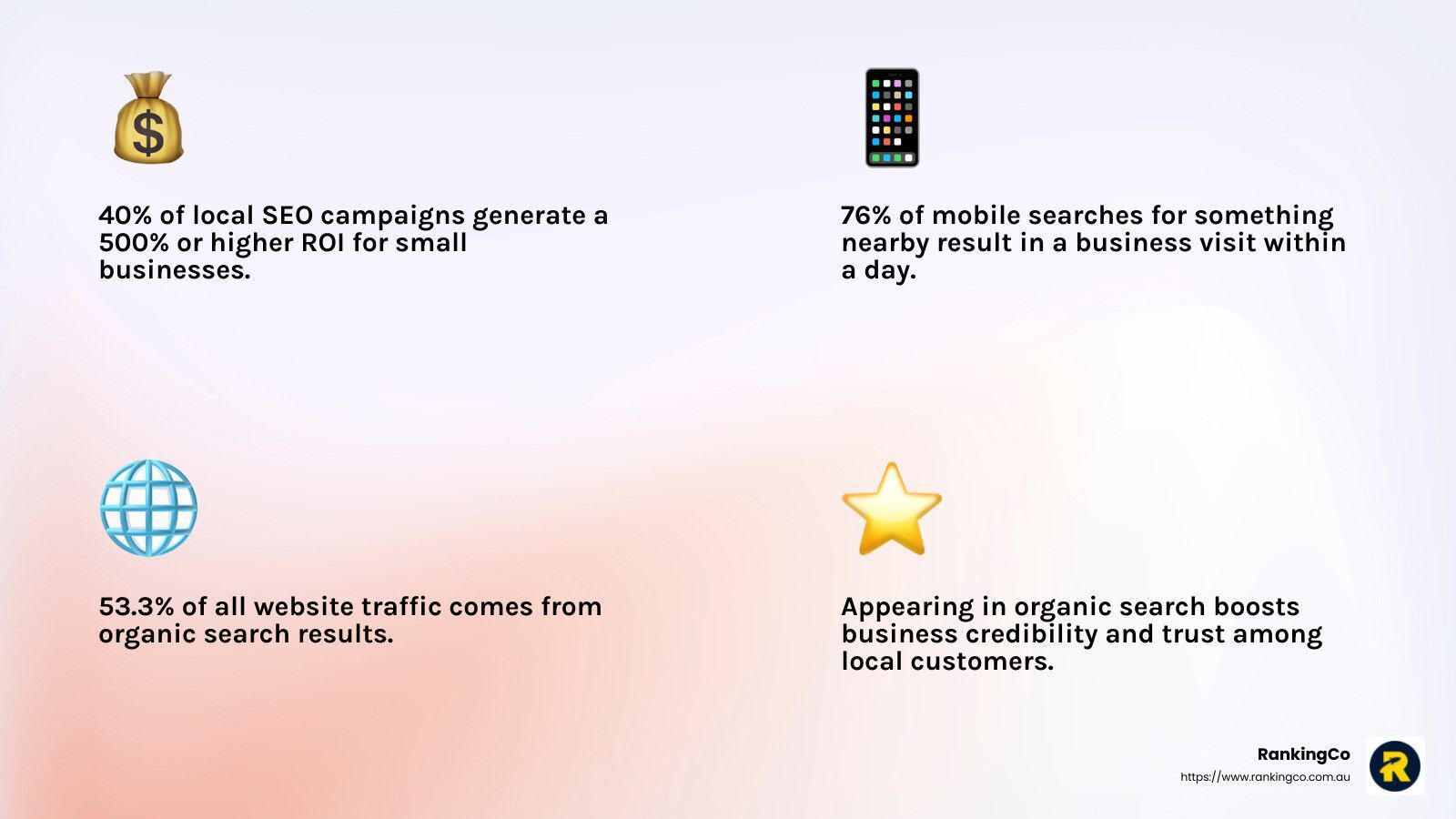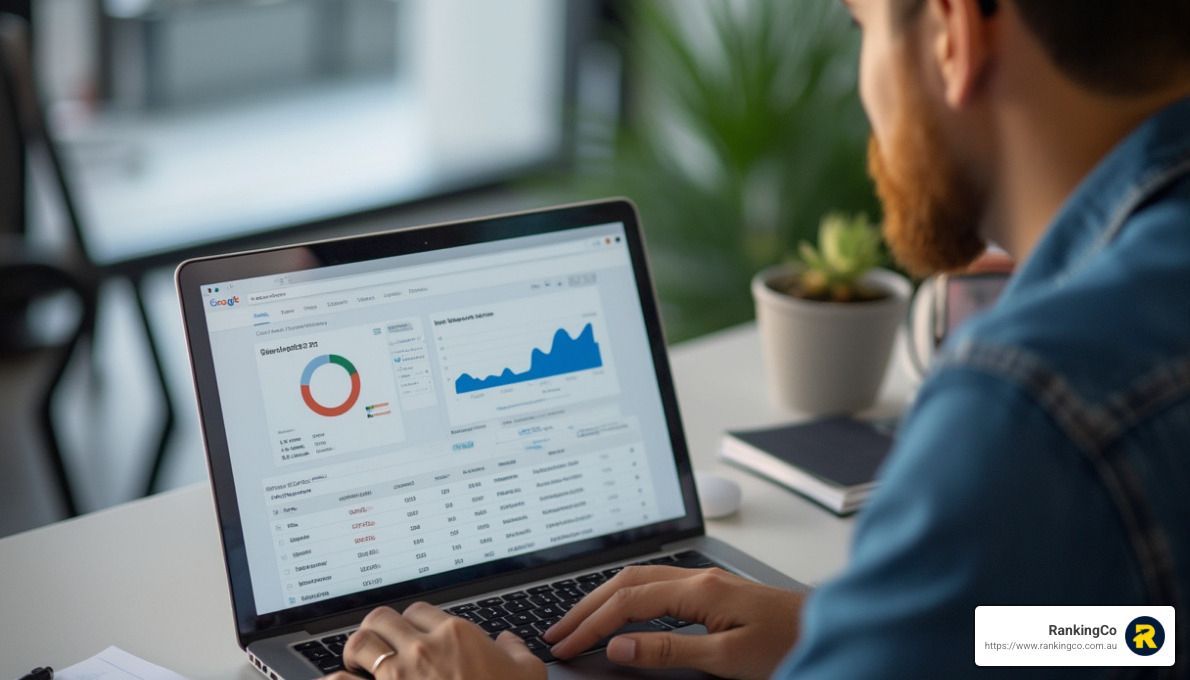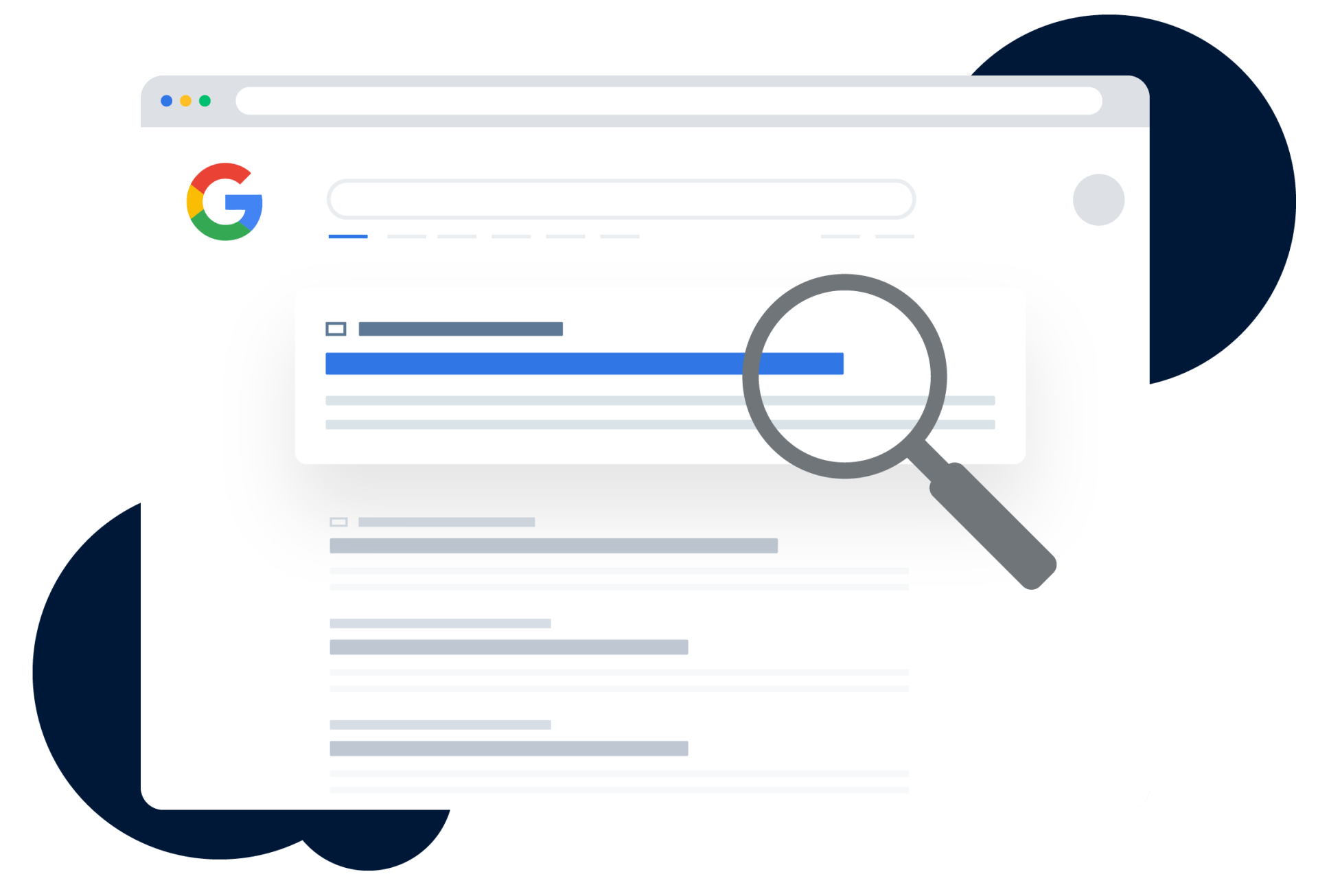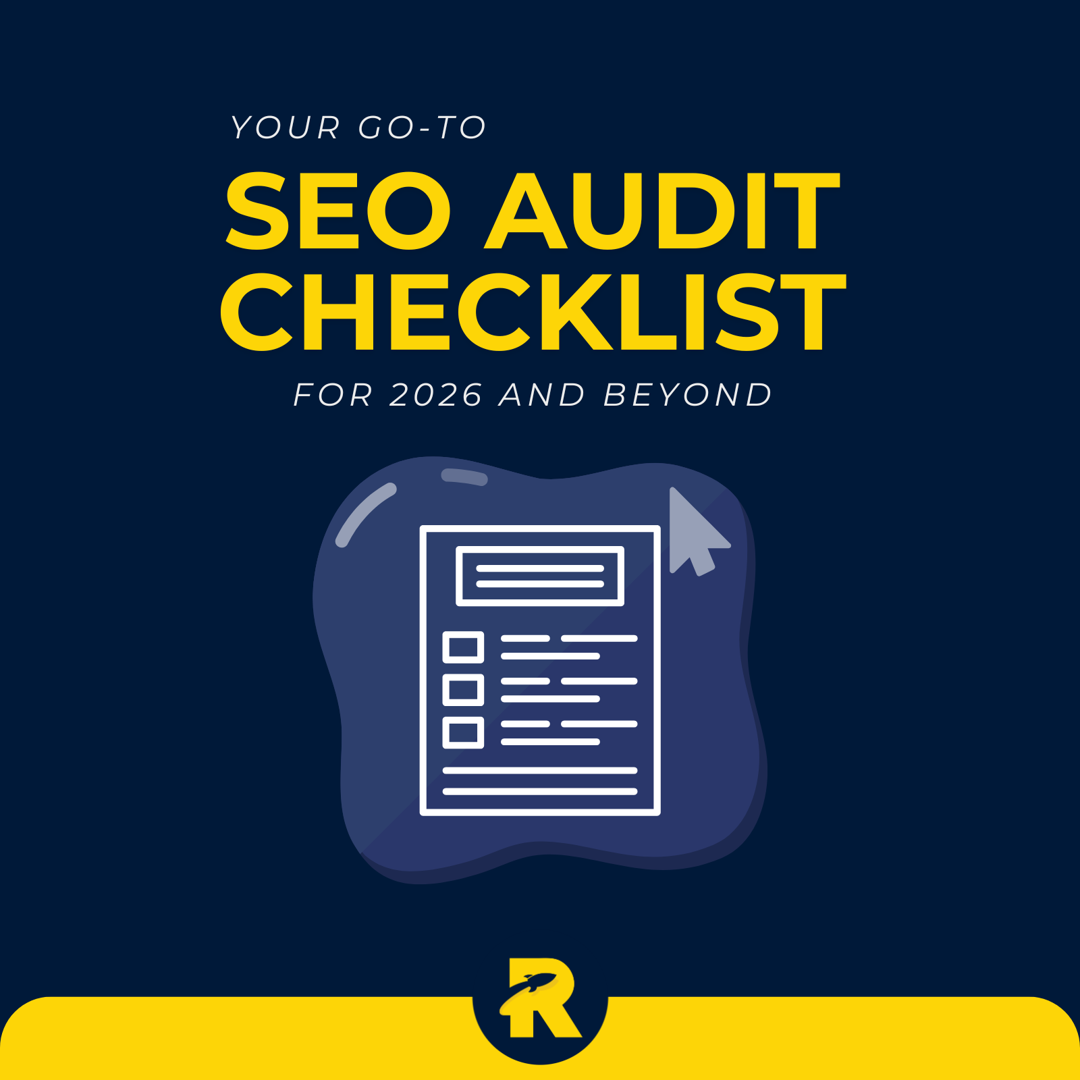From Small to Mighty: SEO Strategies for Small Businesses

Why Small Businesses Need SEO to Thrive
Ever notice how some local businesses seem to pop up immediately when you search online, while others remain hidden in the digital shadows? That's the power of SEO for small businesses at work.
In today's digital‑first world, your online visibility can make or break your business growth. Think about it – when was the last time you flipped through a physical Yellow Pages? Instead, we grab our phones and search for "best coffee near me" or "local plumber emergency".
SEO for small businesses isn't just another marketing buzzword — it's the strategic approach that helps your neighbourhood shop compete with bigger players by making sure you're visible exactly when local customers are searching for what you offer.
The numbers tell a compelling story. When 40 % of local SEO campaigns generate a return of 500 % or more, it's clear this isn't just about being found — it's about serious business growth. And with nearly half of all Google searches having local intent, your potential customers are actively looking for you right now.
I've seen countless small businesses transform their fortunes through smart SEO. Take the local bakery that started appearing for "artisan bread near me" searches and doubled their weekend foot traffic, or the family‑run plumbing service that now dominates emergency repair searches in their suburb.
What makes SEO for small businesses particularly powerful is its ability to level the playing field. While you might not match the advertising budget of national chains, you can absolutely outrank them for local searches with the right optimisation strategy.
The mobile revolution has made local SEO even more crucial. When 76 % of smartphone searchers visit a business within a day of their search, your digital presence directly translates to physical customers walking through your door. Your website effectively becomes your most hardworking employee — present 24/7, even when you're closed, building trust with potential customers through your prominent position in search results.
For Australian small business owners juggling multiple responsibilities, SEO offers something precious: efficiency. Rather than casting a wide net and hoping for the best, you're connecting precisely with people actively searching for your products or services. Someone searching for "organic butcher Brisbane northside" is much more likely to become a customer than someone who passively sees a general advertisement.

I'm Amber Porter, CEO of RankingCo, and I've witnessed how effective SEO for small businesses strategies have transformed local companies from hidden gems to neighbourhood go‑tos. When 97 % of people search online to find local businesses and 72 % of consumers who perform a local search visit a store within five miles, the question isn't whether you can afford to invest in SEO — it's whether you can afford not to.
The digital landscape might seem overwhelming, but with the right approach, your small business can thrive online. Whether you're competing with other local shops or facing off against national brands, strategic SEO gives you the tools to carve out your own digital territory and connect meaningfully with customers who are already looking for exactly what you offer.
Why SEO Matters for Small Businesses
Think of SEO not as just another marketing tactic, but as the digital welcome mat for your small business. In today's connected world, organic search drives a whopping 53.3% of all website traffic – making it your most powerful channel for connecting with new customers.
At RankingCo, we often tell our clients that SEO for small businesses is more marathon than sprint. While paid ads might give you a quick burst of visibility, strategic SEO builds something much more valuable: a digital foundation that continues working for you month after month, year after year.
Let me share some numbers that really drive this home:
When we implement local SEO campaigns for small businesses, 40% of them generate an ROI of 500% or more. That's not a typo – that's five times your investment coming back to you! "Near me" searches have jumped by 136% in recent years as more Aussies reach for their phones to find local solutions. And here's something even more telling: for every click on a paid search result, organic results get 8.5 clicks.
"I was properly skeptical about all this SEO talk at first," shares Mark, who owns a café in Brisbane's west end. "Six months after working with RankingCo, I'm serving flat whites to 43% more new customers who found us through Google. Most live or work just a few kilometres away – exactly the locals we wanted to reach."
Bigger Impact on Modest Budgets
For small businesses watching every marketing dollar, SEO for small businesses delivers exceptional bang for your buck. Consider this: a single local newspaper ad might cost hundreds with no guarantees, while SEO connects you specifically with people actively searching for what you offer.
SEO creates long-term digital assets that keep working for you. Unlike paid advertising that stops the moment you stop paying, your SEO investments continue building value over time. It's like owning property versus renting – you're building equity in your digital presence.
The people who find you through search are typically further along in their buying journey too. They're actively looking for solutions, not passively scrolling past ads. This means higher conversion rates and more efficient marketing spend.
With SEO, you're visible precisely when potential customers need you. Rather than broadcasting your message to everyone and hoping the right people notice, you're there at the exact moment someone is searching for your services. That targeted visibility is marketing gold.
We've seen this change at RankingCo. A local Brisbane plumbing company we work with shifted their budget from traditional advertising to strategic SEO. The results? Their cost per lead dropped by 67% while total leads increased by 124%. That's the kind of game-changing impact that proper SEO for small businesses can deliver.
As your site gains authority and your rankings improve, each additional SEO effort yields even greater results. It's a compounding effect that makes SEO particularly powerful for small businesses looking to maximise their marketing impact on modest budgets.
General SEO vs Local SEO: Which Path Fits Your Business?
When developing an SEO for small businesses strategy, one of the first decisions you'll need to make is whether to focus on general SEO, local SEO, or a blend of both. This isn't a one-size-fits-all situation – the right approach depends entirely on your business model, target market, and service area.
General SEO is all about improving your website's visibility for relevant searches regardless of where those searches happen. Think of it as casting a wider net. This approach works brilliantly for:
- E-commerce shops shipping products across Australia or globally
- Service providers who work remotely (like virtual consultants or online tutors)
- Content creators looking to reach the broadest possible audience
Local SEO, on the other hand, zeroes in on those geographically-specific searches. It's perfect when your business serves a specific area, such as:
- Brick-and-mortar shops where customers physically visit you
- Tradies and service providers who travel to clients within certain suburbs
- Professionals who meet clients face-to-face
When to Prioritise Each Approach
The choice between general and local SEO isn't always clear-cut. Many small businesses actually benefit from a thoughtful combination of both, but knowing when to lean more heavily on one strategy can help you make the most of your resources.
Prioritise Local SEO when your business serves customers within a specific geographic radius. If you're a café in Brisbane's West End, a plumber in Parramatta, or a dentist in Melbourne's suburbs, local SEO should be your primary focus. When customers typically visit your physical location or when you operate in a competitive local market, visibility in Google's Map Pack can dramatically impact your bottom line.
"We've seen remarkable changes for our Brisbane clients who properly optimise their local presence," shares our SEO team at RankingCo. "One restaurant client saw weekend bookings increase by 38% after just three months of focused local SEO work – all from appearing consistently in the Map Pack for 'best dinner spots near me' searches."
Prioritise General SEO when your business isn't tied to a specific location. If you sell products that can be shipped anywhere, offer services that can be delivered remotely, or are building authority in a particular industry niche, general SEO lets you connect with customers regardless of where they're located. This approach is also valuable when your competitive advantage isn't linked to your physical location.
For many small businesses, the sweet spot lies in blending both approaches. A local accountant might focus heavily on local SEO to attract nearby clients while also developing helpful content around specific tax strategies to build broader authority in their field. An online boutique might emphasise general SEO for their e-commerce site while adding local elements to attract customers from their home city.
At RankingCo, we help small businesses find that perfect balance based on their specific goals, competition landscape, and available resources. Whether you need to dominate the local search results in Brisbane or expand your reach across Australia with our eCommerce SEO services, we'll craft a strategy that fits your unique business needs.
Core SEO for Small Businesses: The Absolute Basics
Starting your SEO for small businesses journey might feel overwhelming, but I promise – you don't need a computer science degree to master the essentials. Think of these core elements as the foundation of your house; without them, even the fanciest decorations won't keep the structure standing.
Let's break down these fundamentals in a way that makes sense for your small business.
Keyword Research for SEO for Small Businesses
Keyword research is simply finding what your potential customers are typing into Google when they need what you offer. It's like learning to speak their language – and it's absolutely worth the effort.

When we work with small businesses in Brisbane, we often find they're targeting overly competitive terms while missing golden opportunities right in their backyard.
Here's how we approach keyword research at RankingCo:
We start by mapping out what makes your business special – your products, services, and the problems you solve. Then we use tools like Google Keyword Planner to expand this list and understand search volumes.
The real magic happens when we uncover those "long-tail keywords" – longer, more specific phrases that might have lower search volume but much higher conversion potential. For example, "bakery" is nearly impossible to rank for, but "gluten-free sourdough bakery Southbank Brisbane" could bring your perfect customers straight to your door.
"I was stuck targeting 'personal trainer' and getting nowhere," shares Tim, a RankingCo client. "When we shifted to terms like 'post-pregnancy fitness coach Brisbane northside' and 'senior-friendly personal training Chermside,' my calendar started filling with exactly the clients I wanted to work with."
It's not about finding the keywords with the highest search volume – it's about finding the ones your ideal customers use when they're ready to buy.
Content Strategy in SEO for Small Businesses
Content is where you show both Google and potential customers that you know your stuff. The days of keyword-stuffed pages are long gone – today's successful SEO for small businesses requires content that genuinely helps people.
Google's recent updates have made it crystal clear: create content for humans first, search engines second. This approach aligns perfectly with Google's E-E-A-T principles – demonstrating your Expertise, Experience, Authoritativeness, and Trustworthiness.
For small businesses, this doesn't mean you need to become a full-time blogger. Instead, focus on creating targeted content that showcases your expertise and addresses your customers' specific questions.
A Brisbane florist we work with was struggling to stand out in a competitive market. Together, we created a comprehensive guide to "Wedding Flowers in Queensland" that addressed timing, seasonal availability, and budget considerations specific to our subtropical climate. This single piece of content now brings in a steady stream of engaged couples planning their weddings.
Your content strategy should include well-crafted service pages that explain what you offer, helpful resources that address common questions, and perhaps a few deeper dives into topics where you have unique expertise. Each piece should naturally guide visitors toward becoming customers through thoughtful calls to action.
As one of our clients put it: "I used to think content was just fluff, but now I see it's actually my best salesperson – working 24/7 without a salary!"
On-Page Essentials
On-page SEO refers to all the things you can optimise directly on your website pages. Getting these elements right gives you the biggest bang for your buck in SEO for small businesses.
At RankingCo, we focus on these critical on-page elements:
Your title tags are like the headlines on a newspaper – they need to grab attention while accurately describing what's on the page. Each title should be unique, include your target keyword (ideally near the beginning), and stay under 60 characters so it displays properly in search results.
Meta descriptions don't directly affect rankings, but they're your advertisement in search results. A compelling meta description that includes your keywords and a clear value proposition can dramatically improve how many people click through to your site.
Header structure helps both humans and search engines understand your content. Use a single H1 tag that includes your primary keyword, with H2s and H3s for subsections – much like the outline of a book.
Your URL structure should be clean and descriptive. Compare "www.yoursite.com.au/services/plumbing/hot-water-systems" to "www.yoursite.com.au/page123?id=456" – which one tells you (and Google) what the page is about?
Image optimisation is often overlooked but incredibly important. Compress your images for faster loading, use descriptive filenames, and always include alt text that describes the image while naturally incorporating relevant keywords. This not only helps with SEO but makes your site more accessible to visitors using screen readers.
Internal linking connects related pages on your site with descriptive anchor text. It's like creating pathways that guide both visitors and search engines through your content in a logical way.
Schema markup might sound technical, but it's essentially a way to label your content so search engines understand exactly what it is – whether that's a product, service, review, or local business information. This can result in improved listings in search results, improving visibility and click-through rates.
"We recently helped a Brisbane electrician implement these on-page basics," shares our technical SEO specialist. "Their organic traffic increased by 64% within three months, despite making no other changes to their site. Sometimes the fundamentals really are the most powerful tools in your technical SEO arsenal."
If you're time-strapped (and what small business owner isn't?), focus on optimising your homepage and main service pages first, then gradually work through the rest of your site. This ensures you're improving your most important pages first, where changes will have the greatest impact on your business.
Good SEO isn't about tricking search engines – it's about making it absolutely clear what your business offers and why you're the best choice. When you approach SEO for small businesses with this mindset, both Google and your customers will thank you.
Local SEO Playbook: Rank in Your Own Backyard
If you're a small business serving specific areas, local SEO might just be your secret weapon. With nearly half of all Google searches having local intent, mastering this aspect of SEO for small businesses connects you directly with nearby customers who are actively looking for what you offer.
When we work with local clients at RankingCo, we focus on two main goals: getting them featured in that coveted Google Map Pack (those three local business listings with map pins at the top of search results) and helping them rank well in organic results for searches with local intent.
Let's walk through the key elements that will help your business shine in your local community.
Google Business Profile Optimisation
Think of your Google Business Profile (formerly Google My Business) as your digital shopfront. It's free, powerful, and absolutely essential for local visibility.
"A well-optimised Google Business Profile is like having your business card in the pocket of every potential customer in your area," explains our local SEO team at RankingCo.
We've seen remarkable changes when small businesses take the time to get this right. A Brisbane café we worked with saw foot traffic jump by 27% after we helped them optimise their profile. The most impactful change? Adding menu items as products and posting weekly specials with mouth-watering photos that had customers practically running through their doors.
To make your profile work harder for you:
Complete every single section of your profile. This isn't just about ticking boxes—each piece of information helps Google understand exactly what you do and who you serve.
Choose your categories wisely. Your primary category should be spot-on for your main business function, with relevant secondary categories to capture additional services.
Show off with great photos. Businesses with quality photos receive 42% more direction requests and 35% more website clicks. Your storefront, interior, team members, and products/services should all be professionally showcased.
Keep things fresh with Google Posts. These mini-updates appear directly in your listing and keep your profile engaging. Weekly posts about promotions, events, or news show both Google and customers that you're active and thriving.
Take control of your Q&A section. Don't wait for random questions—create and answer FAQs yourself to provide helpful information exactly as you'd want it presented.
Be available through messaging if you can respond promptly. This additional contact option can be the difference between winning a customer or losing them to a more responsive competitor.
Earning & Managing Reviews
Reviews aren't just nice to have—they're essential currency in the local SEO world. They influence both consumer decisions and your rankings in the Map Pack.
Google itself confirms that "more reviews and positive ratings can improve your business's local ranking." Our data consistently shows that businesses with robust review profiles outrank their competitors.
A local plumber we work with includes a review request with every invoice, offering a small discount on future services for honest feedback. This approach has helped them gather over 200 reviews with an impressive 4.8-star average, putting them miles ahead of competitors.
Building a strong review profile takes a thoughtful approach:
Ask consistently but at the right moment. Train your team to request reviews when customers are happiest—after a positive comment or successful transaction when their experience is fresh.
Make leaving reviews ridiculously easy. Send follow-up emails with direct links to your Google review form, or create a QR code that customers can quickly scan with their phones.
Respond to every single review, good or bad. Thank your happy customers and professionally address any criticism. This shows you're engaged and committed to improvement.
Use negative feedback as free consulting. Rather than getting defensive, see criticism as valuable insight into operational issues you might have missed.
Keep everything genuine. Fake reviews not only violate Google's policies (risking penalties) but also break the trust you're working so hard to build. Focus on earning authentic feedback—it's worth the effort.
Building Local Links & Citations
Think of links and citations as votes of confidence in your business's local relevance. Each mention of your business name, address, and phone number (NAP) helps cement your place in the local business ecosystem.
"We approach local link building more as community relationship building," explains our outreach specialist. "When you contribute genuinely to your local area, the links tend to follow naturally."
For small businesses looking to strengthen their local link profile:
Join local business networks and associations. Chambers of Commerce, industry groups, and business improvement districts typically list members on their websites, providing valuable local links.
Support your community through sponsorships. Local events, sports teams, and charities often acknowledge sponsors on their websites, creating natural link opportunities.
Create resources specific to your local area. A Brisbane dentist we work with created a guide to "Emergency Dental Services in Southeast Queensland" that local health websites and blogs eagerly linked to.
Build relationships with complementary local businesses. A wedding photographer might partner with florists, venues, and caterers for mutual promotion and link exchanges.
Ensure consistent citations across the web. Your business name, address, and phone number should be identical everywhere they appear. Even minor variations can confuse search engines and potentially harm your rankings.
For many of our clients at RankingCo, local SEO delivers the fastest and most tangible results of all their marketing efforts. When done right, it puts your business directly in front of people nearby who are actively looking for what you offer—often with their wallets already open.
Local SEO isn't just about technical optimisations—it's about genuinely connecting with and serving your community. The businesses that understand this fundamental truth are the ones that ultimately win the local search game.
Tracking Success & Avoiding Pitfalls
Implementing SEO for small businesses is like tending a garden – it needs regular attention, care, and a watchful eye to truly flourish. The good news? You don't need to be a technical wizard to keep track of what's working and what needs adjustment.
Must-Have Free Tools
One of the best things about modern SEO is the abundance of powerful free tools available to small business owners. These essentials will give you clear visibility into your performance without stretching your budget:
Google Analytics 4 (GA4) has become the command centre for understanding your website traffic. Think of it as having a window into how visitors find and interact with your business online. You'll want to regularly check your organic search traffic numbers, how long people stay on your site, which pages they visit, and most importantly – whether they're converting into leads or customers.
"Many of our clients are surprised to find that visitors from certain suburbs convert at twice the rate of others," shares our analytics specialist at RankingCo. "This geographic insight allows them to tailor their content more effectively to their highest-value audiences."
Google Search Console (GSC) gives you the rare opportunity to see your business through Google's eyes. It reveals which search terms are bringing visitors to your site, your average position for different keywords, and flags any technical issues that might be holding you back. It's like having a direct line to Google about your website's health and performance.
PageSpeed Insights has become increasingly important as mobile usage dominates search. When we examine the data from our clients, we consistently see that faster-loading websites achieve higher rankings and better conversion rates. This tool not only measures your speed but provides specific recommendations for improvement that you can share with your web developer.
For businesses focused on building a robust technical foundation, our Technical SEO experts recommend complementing these tools with regular site audits to catch issues before they impact your rankings.
Avoid These SEO Pitfalls
Even the most well-intentioned small business owners can fall into common SEO traps. Here's how to avoid the mistakes we frequently see:
Keyword stuffing feels like a relic from the early 2000s, but surprisingly, we still see businesses trying to cram keywords unnaturally into their content. Today's Google is sophisticated enough to understand context and natural language. Write for humans first, with keywords thoughtfully incorporated where they make sense.
A Brisbane florist we worked with was puzzled why their beautifully designed website wasn't ranking well. The culprit? Every page contained the phrase "best florist Brisbane" at least 15 times, often in ways that made the text awkward to read. Once we rewrote the content to flow naturally while still incorporating their keywords meaningfully, their rankings improved within weeks.
Inconsistent NAP information (Name, Address, Phone number) across the web creates confusion for both customers and search engines. When your business details differ between your website, Google Business Profile, and online directories, it dilutes your local SEO power. Take time to audit and correct these inconsistencies – it's tedious work but pays significant dividends.
Mobile optimisation isn't optional in today's smartphone-dominated world. With 76% of people who search on smartphones for something nearby visiting a business within a day, a poor mobile experience directly impacts your bottom line. Ensure your site is responsive, loads quickly on mobile networks, and offers easy navigation with touch-friendly buttons.
Duplicate content issues often arise unintentionally, especially on e-commerce sites where similar products may have nearly identical descriptions. Search engines struggle to determine which version to rank when content is duplicated, often resulting in neither page performing well. Each page on your site should serve a unique purpose with original content.
Poor-quality backlinks remain one of the most dangerous pitfalls for small businesses. "If someone offers to get you hundreds of backlinks for a suspiciously low price, run the other way," advises our link building specialist. "Those links will likely hurt more than help." Focus instead on earning quality links through genuine relationships, valuable content, and community engagement.
Technical issues like broken links, crawl errors, and security problems can silently undermine even the best content strategy. For businesses wanting to get more traffic, regular technical audits are essential. Think of it as preventative maintenance for your digital storefront.
Perhaps the most common pitfall we see at RankingCo is impatience. SEO is indeed a marathon, not a sprint. While some changes can show improvement within weeks, the full impact of a comprehensive SEO strategy typically takes 3-6 months to materialise.
"We had a client who was ready to abandon their SEO campaign after just six weeks," recalls our senior strategist. "We convinced them to stay the course, and by month four, their organic traffic had increased by 62%, leading to a significant boost in enquiries. Now they're one of our biggest advocates for the long-term value of SEO."
SEO is an ongoing process of refinement and adaptation. The businesses that succeed are those who consistently monitor their performance, adjust their approach based on data, and stay aware of industry changes. With patience and persistence, even small businesses with modest budgets can achieve remarkable visibility in search results.
Frequently Asked Questions about SEO for Small Businesses
Let's tackle some of the questions I hear most often when chatting with small business owners about their SEO journeys. These answers might just save you some sleepless nights!
How long does SEO take for a small business to show results?
This is the million-dollar question, isn't it? When I sit down with new clients at RankingCo, I always take a deep breath before answering because the honest truth is: it depends on your unique situation.
Think of SEO for small businesses like planting a garden. Some quick-growing plants might sprout in weeks, but the truly impressive blooms take months to develop. Your SEO timeline depends on several key factors:
Your website's current authority (is it brand new or established?), the competitiveness of your industry (local florist vs. national insurance company), your starting point (are we fixing major issues or building on good foundations?), and how aggressive your strategy is.
Most of our small business clients start seeing encouraging movements within the first 1-3 months. By months 4-6, they're typically celebrating some significant wins. The full maturation of your SEO strategy, however, usually takes 6-12 months.
"I was ready to throw in the towel after two months," admits James, owner of a Brisbane electrical service. "Thank goodness the RankingCo team convinced me to stay the course. By month five, we were ranking on page one for our key terms, and my phone hasn't stopped ringing since."
If you need immediate results while your organic visibility builds, consider supplementing with Google Ads as a short-term traffic solution. Many of our most successful clients use both strategies in tandem.
Should I hire an agency or DIY my SEO?
I get why this is such a common question – you're watching your budget carefully, and SEO seems like something you might be able to tackle yourself with some online research. Here's my candid take:
The DIY approach makes sense if you have time to dedicate to learning SEO fundamentals, your business operates in a relatively uncompetitive space, you're somewhat tech-savvy, and you genuinely enjoy learning new skills. Many successful business owners start this way, handling basics like Google Business Profile optimisation and simple on-page updates themselves.
Partnering with an agency like RankingCo becomes valuable when you're operating in a competitive market where expertise really matters, your time is better invested in other aspects of growing your business, you want to avoid potentially costly mistakes, or you need results within a reasonable timeframe.
The reality I've observed over years of working with small businesses is that many start with enthusiasm for DIY SEO, only to realize how complex and time-consuming it becomes when done properly. That's when they typically reach out to us – not to replace their efforts entirely, but to accelerate their progress and take their strategy to the next level.
"I spent six months trying to handle our SEO myself," shares Michelle, who runs a boutique accounting firm. "I made some progress, but I was spending 10+ hours weekly on it. Bringing in RankingCo freed me to focus on client work while they handled the technical aspects. My only regret is not doing it sooner."
What are the most common mistakes small businesses make with SEO?
After helping hundreds of small businesses improve their search visibility, I've noticed some recurring pitfalls that can seriously limit your success:
Chasing vanity keywords instead of focusing on conversion-driven terms. Ranking for "real estate" might sound impressive, but "first-time home buyer grants Brisbane" will likely bring you more qualified leads.
Neglecting local SEO is a huge missed opportunity. Even businesses that serve broader areas benefit from establishing strong local relevance first. The competition is usually lower, and the conversion rates higher.
Inconsistent effort undermines results. SEO isn't a one-time project but an ongoing process. Sporadic attention leads to sporadic (and disappointing) outcomes.
Flying blind without analytics means you can't know what's working or where to focus your precious time and resources. At minimum, set up Google Analytics and Search Console to track your progress.
Overlooking the user experience is increasingly costly as search engines prioritize sites that visitors actually enjoy using. Technical SEO alone isn't enough if visitors bounce immediately due to poor design or confusing navigation.
Copying competitor strategies without understanding if they're actually working is risky. What appears to be working for them might not be driving actual results, and their business goals may differ significantly from yours.
Expecting SEO to fix everything sets you up for disappointment. SEO drives qualified traffic to your site, but your website needs to convert that traffic through compelling offers and clear calls to action.
At RankingCo, we help small businesses steer these potential pitfalls by developing customised strategies aligned with their specific goals, resources, and competitive landscape. Our integrated approach to digital marketing services ensures that your SEO efforts work in harmony with your overall business objectives.
Whether you're just starting your SEO journey or looking to improve existing efforts, focusing on these fundamentals will help you avoid the most common mistakes and build a sustainable foundation for organic growth.
Conclusion – Let's Get You Ranking!
There's something truly exciting about watching a small business grow through the power of search visibility. Implementing effective SEO for small businesses isn't just about technical tricks or climbing rankings—it's about creating genuine connections with customers who are actively seeking what you offer. For small business owners in Brisbane and across Australia, this represents an incredible opportunity to grow without needing the massive marketing budgets that bigger competitors throw around.
Throughout this guide, we've journeyed from understanding the fundamental differences between general and local SEO to exploring specific tactics like optimising your Google Business Profile and building content that actually answers your customers' questions. If there's one thing I hope you've taken away, it's that effective SEO is absolutely within reach for businesses of your size—and often delivers better returns than any other marketing channel when done right.
At RankingCo, we see the transformative power of SEO every day. We've watched local cafés go from struggling to find customers to having queues out the door. We've helped tradies move from relying on word-of-mouth to having their calendars booked solid with online leads. These successes come from our approach that blends proven techniques with cutting-edge AI technologies:
We start with truly understanding your business and customers, conducting data-driven keyword research that uncovers exactly what your market is searching for. Our technical team ensures search engines can properly access and understand your content—because what good is great content if Google can't read it? We then develop strategic content that showcases your expertise while answering the questions your customers are asking online.
For local businesses, we implement targeted local SEO tactics that put you in front of nearby customers right when they're looking for you. And because the digital landscape never stands still, we continuously monitor and refine your strategy to improve performance over time.
Whether you're just taking your first steps into SEO or looking to lift your existing efforts, our team of Brisbane-based specialists truly understands the unique challenges Australian small businesses face. We speak your language, understand your market, and know what it takes to help you succeed online.
Here's a thought worth considering: every day without proper SEO is another day potential customers are finding your competitors instead of you. The best time to start was yesterday—but the second best time is today.
Ready to transform your online visibility and connect with more of the customers you deserve? Open up Your Potential – Get Ranking with RankingCo














